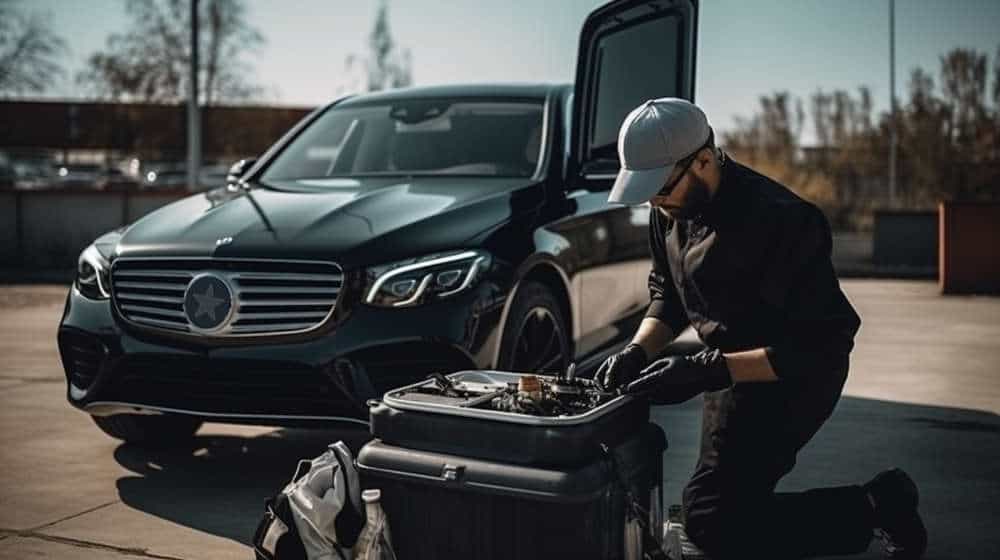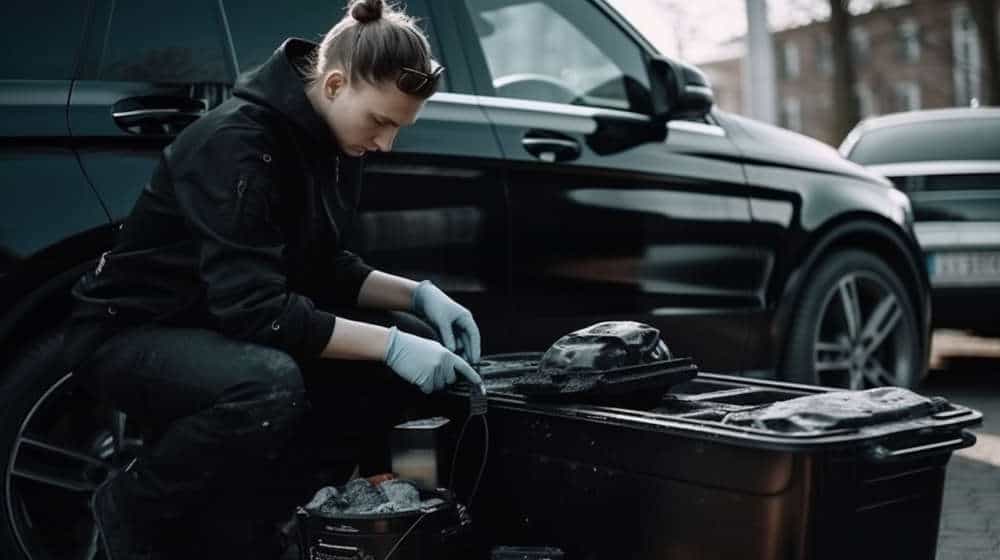Last Updated on May 25, 2023 by Rod Olivares

If you want to supercharge your mobile detailing game, you’re in the right place! Today we’re going to reveal the secret weapon that will keep your business running smoothly in this generator for mobile detailing guide. From powering your tools to unleashing your creativity, this small but mighty machine is a game-changer. Get ready for some electrifying insights!
A good generator for mobile detailing should be powerful enough to operate your power tools, fuel-efficient, quiet, transportable for ease of use, and dependable to prevent malfunctions and downtime. Honda, Champion, DuroMax, Yamaha, and Generac are well-known manufacturers of generators appropriate for mobile detailing.
Let’s learn about the different kinds of mobile detailing generators and see which might fit your own needs.
Types Of Generator For Mobile Detailing

You will surely need a detailing generator if you are pumping water, powering multiple devices, or operating a medium to big detailing company.
The kind of fuel you use directly affects how long your generator can operate before needing to be refueled. It’s crucial to thoroughly consider the pros and downsides of different fuel alternatives before choosing one.
Gasoline Generators

A gasoline-powered generator is the most popular kind. Gasoline generators are cheap, mainly operate on gas, and need minimal maintenance.
Gasoline is a standard fuel for generators used in car detailing businesses due to its cheap cost and broad availability. If your generator needs fuel, every town has gas stations and shops.
The main drawback of gasoline is that it has a limited shelf life. You can keep gasoline for up to a month, then it will degrade and lose its usefulness as fuel. Never keep it in the tank when you don’t need to; always fill it with fresh gas.
Diesel Generators

Due to its lower propensity to evaporate during storage, diesel fuel is nearly as popular as gasoline. A diesel generator is generally more robust and costlier than their gas-powered counterparts.
Like ozone generators, this generator type is not commonly accessible in the market, making it difficult to find one. You may buy one of these fuels at the supermarket or your neighborhood gas station.
Diesel is the second-most affordable choice (in comparison to propane and natural gas). It is more durable and efficient than gasoline, and its shelf life is up to a year. Additionally, compared to gasoline generators, a diesel generator often produces more noise.
Propane Generators

Using a powerful portable generator that uses propane to power detailing equipment is a great option. Propane generators are an affordable choice if you need a backup power source. Additionally, propane is a cleaner fuel source since its burning creates no carbon dioxide.
Finding any propane might take some time since it is less often accessible than other fuels like gasoline and diesel. Generators powered by propane are famous for operating quietly.
Because of this, they are a fantastic option for campers & RVs, homeowners, and mobile detailers alike.
But the cost of propane might be high. Additionally, propane generators often need a separate, linked propane tank, and they may get bulkier as a result.
Solar Generators

Solar generators may be an excellent choice for mobile detailing firms who wish to use a clean, renewable energy source. Solar generators may be quieter than conventional generators and need less upkeep.
A solar generator has significant drawbacks when used for mobile detailing, however. For instance, compared to conventional generators, solar generators may be more costly upfront.
Additionally, more extensive or more power-demanding equipment can need more electricity than solar generators can provide.
Natural Gas
The fastest and dependable alternative for on-the-go detailing is a generator powered by natural gas. Natural gas-powered generators are safer than diesel or gasoline-powered ones since they don’t need liquid.

Yet these generators have not gained popularity since it is unclear if natural gas is accessible everywhere. Furthermore, they may need more power to run your detailing equipment, including vacuum cleaners, electric pressure washers, and other tools.
Natural gas’s main benefit is that it makes a very quiet generator fuel. However, this generator comes at a price since natural gas is expensive and more challenging than alternatives like gasoline, diesel, or propane.
Factors To Consider When Choosing A Generator
Below are essential factors to consider before buying a detailing generator, and if you’re interested, here’s an article on why you need a generator for mobile detailing:
Compatibility with Detailing Equipment
The type of equipment you will be powering is the most critical factor to think about when choosing a generator for detailing. Ensure you have a generator to handle it if you want to power giant vacuums or air compressors.
Brand names may not be as important to you if you are on a tight budget, but if you plan to spend $700 or more, we strongly advise looking at a respected brand like Westinghouse portable generators, Champion power equipment, Honda generators, or Yamaha, known to produce the best portable generators in the market.
Knowing how much power your auto detailing equipment needs can help you choose the correct generator. Nevertheless, It is advisable never to choose a generator that outputs less than 2000 watts.
Watts, Amps, and Volts
There should be two readings for each generator you choose: the continuous (or rated) watts and the maximum (or peak power) watts.
Watts: Will your generator be running for more than 8 hours each day? Ensure that the gadgets you are powering remain within the range of continuous power. A motor should never be used continuously over the rated (continuous) wattage rating.
Volts and amps: Voltage output is the difference in charge, and amps are the strength of an electrical current. You should know the power needs for any item you buy, including power vacuums, polishers, and other equipment.
Consider that you want to power an air compressor that needs 15 amps to function at an average of 120 volts of electricity. Search for a generator that continuously provides at least 1,800 watts of electricity.
Portability and Ease of Use

Firstly, the size of your consumer base will determine if you require a generator. Electricity is readily available in residential areas so you may get by without one. However, your choices are limited if you are detailing in parking lots.
Make sure your selections are portable and lightweight. Buy a portable power generator that will fit comfortably and take up little room in your truck since your job will demand you to go to your client’s site.
Small, portable generators work well for connecting vacuums. It is also a good idea to purchase two parallel-capable, lightweight, and a compact generator instead of transporting a single large generator.
Fuel Efficiency
The size of your fuel tank and fuel capacity significantly impacts how effective your generator is. A gas-powered generator will exhaust its fuel more rapidly than a generator that works on liquid propane or gasoline.
Most inverter generators have a single tank and cannot operate continuously at full load for more than 4 to 5 hours. More significantly, the best generators may operate for up to 10 hours and have larger tanks with dual fuel technology.
The capacity of an inverter to automatically modify an engine speed owing to its microprocessor technology is a crucial benefit. An inverter also recognizes the requirement and uses fuel effectively, reducing waste.
Noise Level
Are there any restrictions on the noise allowed in specific business parks or cities? Maintaining focus with a noisy generator might be challenging. To solve this issue, multiple companies are focusing on creating quiet generators.
If noise is your biggest concern, look for the best portable generator with decibel (dB) ratings between 50 and 60. Inverters and propane-powered generators are the ones that are the quietest. They are the most effective and stealthiest choice.
When purchasing a mobile detailing generator, you should also look for features like sound dampening and pulse technology that reduce background noise.
Additional Features
When choosing a generator for mobile detailing, it is good to look for additional benefits. Does the inverter generator come with a connection, a magnetic oil dipstick, an intuitive control panel, a built-in fuel gauge, or a parallel connection kit? Is it easy to switch between the different controls?
An extra-long extension cable could be helpful if you don’t need to relocate the generator often. Look for a generator with handlebars or wheels if you need something simple to transport.
Most generators include LED lights that display how much oil or gasoline is still in the engine and tank. With these added elements, your detailing tasks may be more straightforward.
How To Size A Generator For Your Mobile Detailing Business

Generators exist in various sizes and kinds, so choosing one that will meet your demands is critical. Many people buy generators to power a vacuum cleaner, an electric pressure washer, buffers, blowers, and dryers.
For instance, if you have a team of 2-4 individuals performing interior and exterior detailing while utilizing various appliances simultaneously, you may invest in a powerful generator.
A 3000-watt robust generator is a great option and guarantees that all the equipment you need for detailing cars has enough power. But each auto detailing business is unique, and each uses different equipment. You must know your equipment, its strength, and other things.
The two common types of generators you need to consider:
Inverter Generator
The best generator for mobile detailers aids the use of inverter technology. They don’t always function 100% and only function to the extent necessary to power the plugged-in tools. Because of their high efficiency, you will consume less fuel. Also, they are significantly quieter.
Conventional Generator
Compared to inverter generators, conventional or traditional generators are less expensive and often produce more watts for the same investment. Since they operate at the same speed continuously, they are less fuel-efficient. They are often more enormous and less silent than inverter generators.
Typical Generator Issues for Car Detailing

The performance and dependability of generators used in vehicle cleaning operations may be affected by various problems. The following are some typical issues with generators used for vehicle detailing:
Power output difficulties
Power output variations or a generator’s inability to provide the necessary power affect how well detailing tools like vacuums and pressure washers work. Inadequate load balance, difficulties with the voltage regulator, or faults with the engine may all contribute to this.
Engine starting issues
Problems with the fuel, ignition, or other parts may prevent generators from starting. Problems with the ignition system, weak battery, stale gasoline, blocked fuel lines, or clogged fuel filters may bring this on.
Overheating
Generators may overheat due to prolonged use under significant loads, insufficient cooling, or poor ventilation. Overheating may result in reduced performance, engine damage, and even generator shutdown.
Fuel concerns
Fuel supply concerns, such as contaminated fuel or problems with fuel lines or carburetors, may affect generator performance. Several problems may impact the performance and dependability of the generator.
General deterioration
A generator is subject to typical wear and tear over time, like any mechanical device. This deterioration may include problems that affect the performance and dependability of the generator, such as worn-out spark plugs, filthy air filters, loose connections, or worn-out belts.
Maintenance and Safety Tips For Your Generator
Even if you depend on external power sources, keeping a generator as a backup is a good idea.
- Choose a conventional generator that is lightweight enough to avoid being a strain if you start on a tight budget.
- Get something more transportable, such as an inverter generator (or a smaller generator with wheels), if you specialize in interior finishing and need to be mobile.
- Maintain the generator battery’s charge at the bare minimum. Some folks will often charge their generators just partially. Instead, give your battery a full charge sometimes.
- Put a lock to your portable generator. You wouldn’t want a robber to notice yours.
- Do not overload your generator.
- Remember to monitor the low oil indicator and replace oil as necessary.
- Do not use old fuel in any generator. Be careful to empty and refill your generator’s tank if it operates on gasoline or diesel.
Wrapping It All Up For Ya!
High-quality and dependable generators for mobile detailing is indeed a great investment. While not necessarily required, they simplify your life by enabling you to detail automobiles wherever you are.
Choosing the appropriate generator for your mobile detailing services is essential to guaranteeing that you always have a dependable and sustainable power supply.
Whether you use a conventional or inverter generator, having more than enough power supply will enable you to provide your clients with superior service wherever you may be.

Scott Krager purchased generatorgrid.com in the summer of 2020 and quickly began to buy every generator under the sun! He currently has over a dozen generators and the number is growing quickly. He lives in Portland, OR near his family and friends.
GeneratorGrid.com is an independent review business. I am not affiliated with any manufacturers and do not accept paid reviews. When you buy through my links, I may earn a commission which helps me purchase more generators for testing. - Scott Krager

